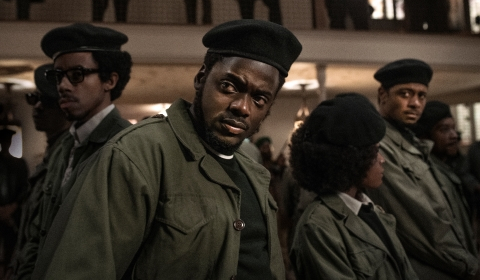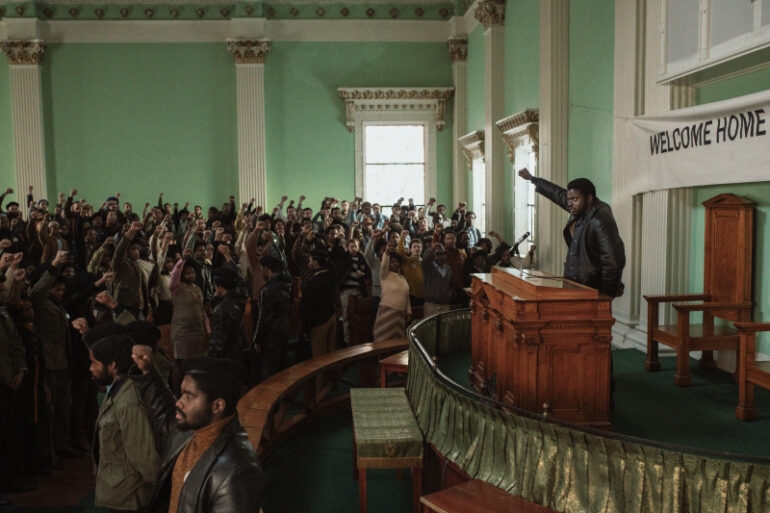Dealing with African American history, the sad but nevertheless encouraging plot of the award-winning movie Judas and the Black Messiah shows: »You can murder a revolutionary, but you can’t murder revolution«.
By Seda Saygili
Bilder: © 2021 Warner Bros. Entertainment Inc. / Photo Credit: Glen Wilson
War is politics with bloodshed, and politics is war without bloodshed.
In Judas and the Black Messiah, film director Shaka King reveals a forgotten part of Black American history by telling the story of the assassination of Fred Hampton, who was an African American activist and chairman of the Illinois chapter of the Black Panther Party. Seeing actors Daniel Kaluuya and LaKeith Stanfield together after the horror-thriller Get Out (2017) in the different setting of a historical bio-drama attracts many eyes per se, and the impressive performance of both fulfils the expectations.
At the recent Oscars, the movie had six nominations including best picture – for the first time for a film with an all-Black production team – cinematography, and best supporting actor for Stanfield, and it won two Oscars: best supporting actor for Kaluuya and best original song for Fight for You. Kaluuya’s performance had also won a Golden Globe and a Critics’ Choice Award.
In a nutshell, the movie is about William »Bill« O’Neal, an informant of the FBI, who infiltrates the Illinois chapter of the Black Panthers to destroy them by getting closer and closer to Fred. The plot is based on true events: Fred Hampton was assassinated with ninety-nine bullets during a raid by the Chicago Police Department and the FBI while he was sleeping in his house on December 4, 1969. He was only 21 years old when he was killed.
Based on a True Story
The Black Panthers were active revolutionary socialists in the United States. They politically supported Black power, defended the ideas of Malcolm X, protected Black neighbourhoods from the Ku Klux Klan — a white supremacist and racist organization — and combated police brutality towards Black people. The Black Panther Party sought equality in education, housing, and employment. Fred Hampton was a member of the NAACP (National Association for the Advancement of Colored People), working on the rights of the Black community. Sadly, the Black Panthers were seen as a danger by the FBI and the police, which made the police attack all people supporting them. They demanded justice, summed up in their slogan: »All power to all people«.
So, how do we win this war? What’s our most lethal weapon? Guns? Grenades? Rocket launchers? There’s strength in numbers. Power anywhere there’s people.
The movie’s title alone is brilliant: It alludes to the biblical story of Judas who betrays his best friend, Jesus, by identifying him to Roman soldiers. Judas here is represented by William O’Neal, who not only betrays his friend, the Black Messiah, but also betrays his own race. Shaka King uses O’Neal as the narrator which shows his history from a subjective perspective. We witness the events through O’Neal’s eyes and see him being threatened by the FBI. There is no main character in this film. Although Bill O’Neal seems to be the main villain, Shaka King underlines the fact that he was only 17 when he betrayed Hampton. Both Hampton and O’Neal are in the centre of the story.

One of the achievements of the film is that it humanizes every character and makes the audience sympathize with them. Judas and the Black Messiah encourages people to ask for their rights and freedom, following the line of Fred Hampton: »As Che Guevara said, words are beautiful, but action is supreme«. He means that in reacting to injustice, it is vital to fight it rather than just talk about it. The film also suggests that freedom can’t be murdered. The beauty of the soundtracks deserves special attention, too. They are all beautifully harmonious with the cinematography. Especially The Rain, performed by Eddie Gale, an African American jazz musician, stands out.
Realism Instead of Over-Dramatization
Judas and the Black Messiah
USA 2021
126 minutes
Director: Shaka King
Cinematography: Sean Bobbitt
Starring: Daniel Kaluuya, LaKeith Stanfield, Jesse Plemons, and others
However, there are things about this film that need criticism, such as the depiction of the relationship between Fred Hampton and Deborah Johnson. Apart from being a political film, this film is about the love story of Deborah and Fred, whose portrayal could have been more powerful. Johnson, Fred Hampton’s girlfriend, was with him at the very night of his murder along with some other Black Panther members. She was also pregnant with Hampton’s son when he was murdered. While this scene should evoke considerable sympathy, it only partially does. Whether it is because of the disharmony between the actor and the actress or the set-up of the scene, the couple somehow seems inauthentic, and this undermines the impact of their story. Apart from that, it would have been interesting to see more about the life story of Fred; maybe some flashbacks from his childhood would have shown a lot about the man behind his political statements.
Thus, it is true that this is a sad story, however King, director and co-writer of the film, does not choose to agitate it with over-dramatization, which makes the movie more realistic. At the very end of the film, William O’Neil’s actual interview is shown with his only final comment, »I think I’ll let history speak for me«, which is very ironic and absurd at the same time. This movie highlights an underrepresented part of America’s Black history and by revealing uncomfortable pieces of the past, shows that what is personal is political. It is a very thought-provoking film that helps better understand this chapter of American history. Today’s American society can learn a lot from the movie regarding the ongoing unequal treatment of African American people in the United States.






